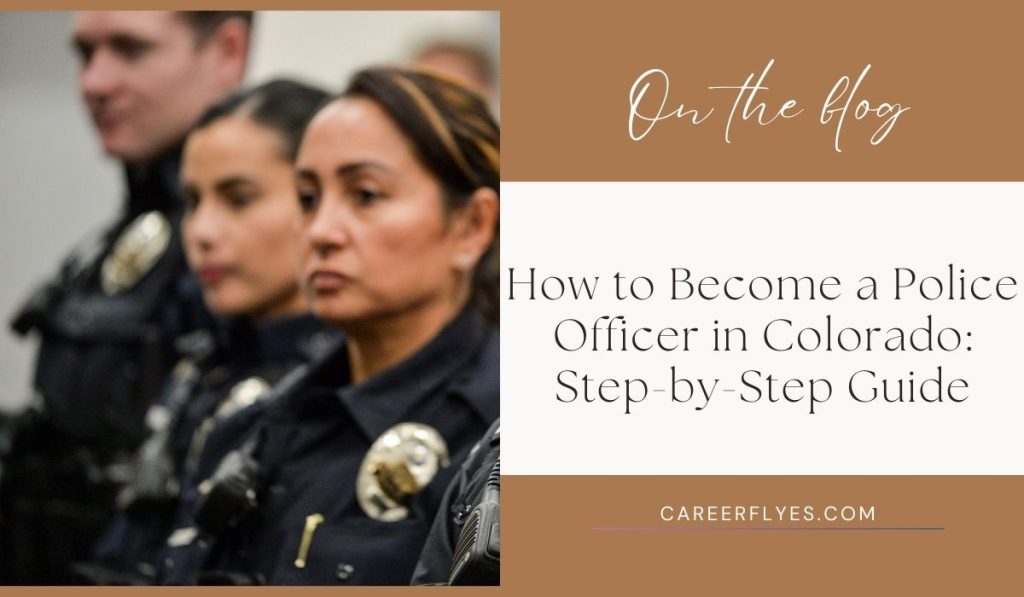How to Become a Police Officer in Colorado: Step-by-Step Guide
6 min read
Becoming a police officer is not just a job—it is a calling. For many, it is about serving and protecting the community, standing up for justice, and making a difference in the lives of others. If you are looking to wear the badge in Colorado, there is a clear path to follow. It might not always be easy, but if you are determined, the road is well worth it.
In this guide, I will break down each step to help you on your way to becoming a police officer in Colorado.
Basic Requirements to Become a Police Officer in Colorado

Let us start with the basics. Before you even think about the training or academy, there are a few minimum requirements you need to meet. These are like the gatekeepers, the first steps to see if you have what it takes.
- To apply, you must be at least 21 years old. If you are not quite there yet, use the time to work on your fitness, get a solid education, and familiarize yourself with the criminal justice system.
- You need to be a U.S. citizen or a legal resident. Law enforcement agencies in Colorado require that you have legal standing in the country. Think of it like needing the proper paperwork before starting any official business.
- A high school diploma or GED is the minimum educational requirement. While some departments prefer applicants with college education, this basic level of schooling will open the door for you.
- Every police officer in Colorado must have a valid driver’s license. You will be driving patrol cars, responding to emergencies, and much more, so being licensed is a no-brainer.
- Having a clean criminal record is key. No felony convictions or serious misdemeanors are allowed. Law enforcement officers are held to the highest standards, so the department will check your background thoroughly.
Physical and Mental Fitness Requirements
Being a police officer is not just about brains—it is also about brawn and heart. You need to be physically and mentally fit to handle the job. Here is what you should expect.
Physical Fitness Test
Before you can join the force, you will need to pass a physical fitness test. This will test your endurance, strength, and agility. Think push-ups, sit-ups, running, and sometimes even an obstacle course. Imagine chasing down a suspect or having to lift heavy equipment—this is why you need to be in top shape.
Medical Examination
You will also have to pass a medical examination. This ensures you are in good health and can handle the demands of the job. It is a bit like a car’s tune-up—everything needs to be running smoothly before you hit the road.
Psychological Evaluation
The job of a police officer can be stressful, so a psychological evaluation is required to ensure you are mentally prepared. They want to know that you can handle high-pressure situations, make smart decisions, and stay calm when the going gets tough.
Educational and Training Requirements
After meeting the basic and fitness requirements, the next step is your education and training. This is where you learn the skills you need to protect and serve.
Police Academy Training
All aspiring police officers in Colorado must go through POST certification, which stands for Peace Officer Standards and Training. You will attend a police academy where you will learn everything from the law to defensive tactics, firearms training, and how to handle high-pressure situations.
The police academy is where you will truly see if you are cut out for the job. It is a mix of classroom learning and hands-on training—kind of like boot camp for your brain and body.
College Education (Optional)
While not mandatory, some police departments in Colorado prefer candidates with some college education, especially in fields like criminal justice, sociology, or psychology. Having a degree can help set you apart from other candidates and might give you a leg up when it comes to promotions down the line.
On-the-Job Training
Once you have completed the academy and become a POST-certified officer, your training does not stop there. You will spend time with experienced officers through on-the-job training. Think of it like learning from the best. You will ride along with seasoned officers, handling real situations under their guidance.
Application Process to Become a Police Officer in Colorado
Now, let us dive into the nitty-gritty of the application process. This is where you officially put yourself in the running to become a police officer.
Submit an Application
The first step is to submit an application to the department you want to work for. Each department in Colorado has its own process, but most allow you to apply online. It is like submitting a job application anywhere else, but be sure to include all the required documents.
Pass Written Exams
Next up is the written exam. This will test your reading comprehension, writing skills, and ability to think critically. The exam can be challenging, but it is nothing a little preparation cannot handle. Think of it like any other big test—you just need to study and stay calm.
Pass the Oral Interview
If you pass the written exam, you will move on to the oral interview. This is your chance to shine and show the department why you would make a great officer. Be ready to answer questions about your background, problem-solving abilities, and why you want to become a police officer.
The interview is like your first impression—so make it count!
Background Check and Drug Test
Before you are hired, the department will perform a background check and drug test. They need to make sure you have a clean record and are not using any illegal substances. This step is non-negotiable, and any red flags here will likely disqualify you.
The Colorado POST Certification
You will hear a lot about POST certification during your journey to becoming an officer. Let me explain why it is so important.
POST stands for Peace Officer Standards and Training. It is a certification that all law enforcement officers in Colorado must have. Without it, you cannot legally work as a police officer in the state. It is like having a driver’s license—you need it to be on the road.
To get your POST certification, you will need to pass a written and physical exam at the end of your training. The exam tests everything you learned at the academy, from legal knowledge to physical fitness. It is the final hurdle before you can officially call yourself an officer.
Once you are POST-certified, you need to maintain your certification through continuing education and regular training updates. Law enforcement is always evolving, so staying sharp is essential.
Additional Skills and Qualities for Police Officers in Colorado
Beyond the technical skills and training, there are a few personal qualities that will make you a great police officer. These are the traits that help you succeed on the job and in the community.
Communication and Problem-Solving Skills
Good communication is crucial. Whether you are talking to a victim, a suspect, or your fellow officers, being able to express yourself clearly and listen carefully is key. You will also need excellent problem-solving skills to handle the wide variety of situations you will face.
Integrity and Strong Ethics
Above all, integrity is what separates a good officer from a great one. People need to trust that you will do the right thing, even when no one is watching. Your ethics will guide your decisions and help build trust with the community.
Adaptability and Stress Management
Police work is unpredictable, and being adaptable is essential. You might start your day handling routine traffic stops and end it responding to a high-stress emergency. Staying calm under pressure and managing stress is part of the job.
Career Advancement and Specialization Opportunities
Once you become a police officer, the opportunities for growth are endless. Let us look at how you can advance your career.
Special Units and Divisions
As you gain experience, you can apply for special units like SWAT, K-9 units, or narcotics. These roles require additional training and offer more specialized work, allowing you to focus on specific types of law enforcement.
Promotion to Higher Ranks
With time and experience, you can move up the ranks—from patrol officer to sergeant, lieutenant, and even captain. Each rank comes with more responsibility and leadership opportunities.
Conclusion
Becoming a police officer in Colorado is a rewarding and challenging journey. From meeting the basic requirements to completing the academy and earning your POST certification, there is a lot to learn and do. But with dedication and the right mindset, you can make a real difference in your community.
So, if you have a strong sense of justice and a desire to serve, start your journey today. Colorado needs officers like you!






